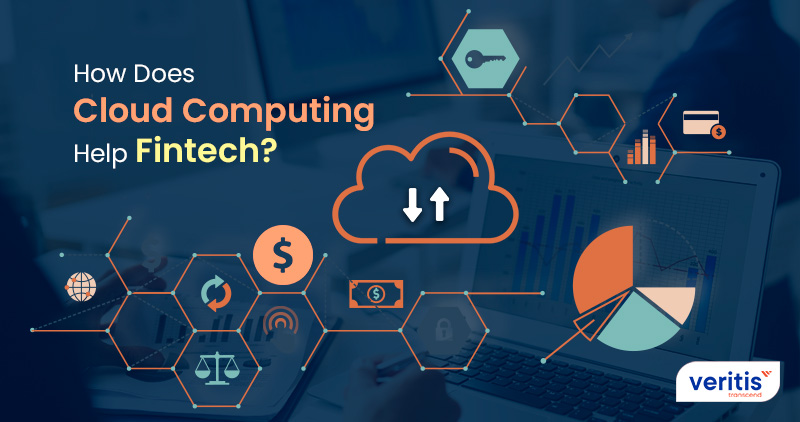
Table of contents
Money matters. If anything, global commerce is what keeps the world moving. Whether barter trade or financial banking, commerce has been around for a long time. But, with time, technology has reshaped the way we trade. For instance, hardbound ledgers were replaced by spreadsheets, and the same spreadsheets are now shared and edited by countless authorized people across the world. Now, cloud computing fintech solutions have taken the world by storm.
The integration with financial service IT solutions sped even more with the advent of smartphones. Financial technologies are thoroughly revolutionizing the corporate sector. The future of the cloud is reshaping financial services solutions with ground-breaking concepts that solve problems linked to money that we face daily. In this blog, we shall understand why cloud computing fintech is picking up pace and what are the benefits of cloud adoption that fintech can experience once they initiate the cloud integration.
Understanding Cloud Computing Fintech

Fintech firms are harnessing the power of cloud computing to reshape the financial industry. As a result, cloud service providers for the fintech industry are maximizing their potential. Financial companies can innovate thanks to cloud computing fintech solutions, which also help them save money on operational and regulatory expenses. In addition, customers gain better experiences because cloud computing fintech solutions increase the banking sector’s efficiency and competitiveness.
FinTech, in its simplest form, is a phrase used to refer to a wide range of integrated technologies, including software, mobile applications, and other tools, that enhance and automate conventional forms of finance for both businesses and their customers. The financial infrastructure-as-a-service (IaaS) aims to help FinTech firms execute highly secure transactions swiftly within an internal network while enhancing user experience. The intricate (but practical) approach streamlines financial transactions while also removing different stages from the transaction process. Ultimately lowering the cost and increasing the accessibility of financial transactions.
What Cloud is to Fintech
Digital technologies were embraced at an exponential rate despite the global business pandemic, with cloud computing emerging as a key facilitator. Organizations have profited from adopting cloud technologies to create a work environment that prioritizes data and technology.
There are more unicorns than any other industry in the burgeoning fintech sector. Due to the vast volumes of data that need to be securely handled, saved, and analyzed, fintech now has to leverage cloud technology. This is in line with the DNA of fintech, which strongly emphasizes speed, scalability, agility, and accountability for the custody of sensitive information. Cloud-native applications are created, crafted, and maintained in the cloud.
These cloud-native infrastructure apps make deploying new features and solutions easier since their architecture is inextricably linked to the cloud. However, on-premises programs that were migrated to the cloud are not suited for the environment and do not exist in a typical cloud-based environment.
The complexity of cloud-native applications is essential for financial services solutions since transactions are continually in motion and happen quickly. For instance, having a cloud-native infrastructure will allow you to scale with more regular surges in transaction volume to our systems and lay the groundwork for extending our current platform to include a robust API ecosystem. In addition, cloud-native apps’ scalability and dependability reduce the impact of outages, especially during high usage times. This may also make it simpler to transition to an API-driven platform and supply vital building blocks so that clients and partners may incorporate compliance into their cloud banking platforms.
Why Veritis is Best for Cloud Security
Advantages of Cloud for Fintech

To offer practical solutions to businesses and customers, cloud computing fintech organizations are increasingly relying on the cloud. According to a LogicMonitor analysis, 87% of cloud computing fintech intend to hasten their cloud migration by 2025. It is a given that the attractive benefits of cloud adoption are attracting Fintech firms. Let’s look at the advantages of cloud-native applications for cloud banking platforms.
- Flexibility: Businesses need to respond swiftly to market developments to stay ahead of the competition if they want to compete. Cloud computing in financial services meet this demand by allowing businesses to quicken the scaling process. Cloud banking platforms can swiftly adjust their capacity up or down to satisfy client demand.
- Affordability: Most fintech firms lack the cloud-native infrastructure needed to develop cloud computing fintech solutions that can be used by several financial institutions and perhaps millions of their clients. The fact that the vendor offers all necessary cloud-native infrastructure for a reasonable monthly price rather than the significant capital expenditure is one of the cloud’s main draws. The cloud vendor will manage the cloud-native infrastructure, keep it safe using advanced firewalls and other technologies, and give 24/7 technical support in addition to providing the hardware and networking — all included in the price.
- Swift Production: Cloud banking platforms may discover that their businesses develop quickly and unexpectedly. Even while it looks like a positive thing, some businesses are not ready for it. Their financial services solutions cannot handle the demand, resulting in their carefully built reputations suffering. It may be challenging to bring back the investor and consumer faith.
The benefit of cloud adoption is that it provides financial companies with unmatched, on-demand scalability, guaranteeing that their infrastructure can expand as rapidly as their business. Pay-as-you-go pricing also prevents businesses from spending money that is not necessary.
- Security: Security and compliance are top issues for fintech organizations since they handle sensitive data. Like financial services solutions, cloud suppliers are also required to adhere to stringent rules and put in place reliable safeguards in the cloud strategy to guard against hacking, virus, and internal data theft on the data and systems of their clients. These precautions include next-generation firewalls, intrusion detection and prevention systems, in-flow virus protection, and encryption. Zero-trust verification and VPN usage can strengthen each of these safeguards even further. Additionally, single tenancy private cloud deployment may guarantee compliance for businesses handling the most delicate personal data.
- Modernized: Many emerging cloud computing fintech solutions provide remote, self-service technologies to clients. Demand for these technologies rises as customers become more digital and banks close their main street branches. Customers, of course, can access them online for remote use. As more companies offer remote work, employees also need to access these technologies outside the workplace. The cloud banking platform is the single workable option for providing these technologies.
- Data-Production Improved: The cloud is the perfect solution for businesses that depend on data. Teams can quickly deploy analytics, AI, and machine learning tools to deliver crucial insights. They can access data along with the most recent versions of synced files and documents whenever necessary and wherever they are based. It allows silos to be broken down and data to be centralized, merged, and enhanced.
- Future-Proof: Cloud computing fintech solutions are fantastic because it is ready for the future. Most modern apps are cloud-based and open source, allowing fintech companies to use them for free, install them immediately, and customize them for their needs. The rivalry among cloud service providers also assures an ongoing investment in their technologies. The performance of hardware is continually improved, for instance, while services like security, disaster recovery, business continuity, and customized technical assistance are continually improved. Naturally, when it comes to resources, the sizable data centers of cloud suppliers ensure that fintech companies always have the storage and bandwidth they require to deliver their services and the confidence that they will be continuously available.
- Better UX: People of the latest generation don’t favor going to the bank. Thanks to technology, most of them have never visited banking offices. This cloud-powered technology has enabled countless transactions, which previously made the users jump through various hoops. Be it Zelle or net banking; users now enjoy bettered customer experience with mobile apps. This is one advantage that every fintech firm can leverage, as customer satisfaction is a crucial component.
Useful link: What is Cloud Computing Security?
Drawbacks of Cloud Computing Fintech Solutions
FinTech organizations continue to have the possibility to accelerate corporate growth through the incorporation of cloud computing. But unfortunately, while a handful of FinTech businesses have used these infrastructures to great success, some businesses have failed. Any business that invests in cloud computing fintech solutions might have adverse effects.
Businesses must start recognizing these possible difficulties and actively work to prevent them.
- Too Much of a Change: It’s challenging to handle change. However, businesses must continue to cloud adoption as it develops. FinTech organizations risk an inflow of user inconsistencies if they fail to construct platforms utilizing modern technologies. On the other hand, if they want to scale up, they face the danger of impeding the company’s overall agility. By removing old data, cryptic patches, and significant inefficiencies, businesses may proactively repair their issues and foster infrastructure continuity by employing current and open-source technologies.
- Lack of Comprehension of Capacity: To ensure the creation of a successful cloud computing fintech solution, extensive capacity planning is needed when using FinTech engineering. Companies face the danger of building infrastructures that cannot handle the number of metrics utilized if no preparation is made. As a result, dashboard performance may be ruined, and problems may become hard to fix. Regardless of the providers chosen, planning is necessary at every level.
- Overestimating Cloud Abilities: FinTech engineers continually put new technologies into practice to maintain their competitive edge in a quick-paced, cutthroat sector. While businesses must keep developing new ideas and ways to improve their offerings, operations shouldn’t veer too far from their initial mission. Businesses should try to remove extraneous additions from their projects that might waste time and money. Don’t complicate essential financial services solutions.
- Lack of Plan: For a business to succeed, it needs independence, adaptability, and a cost structure. Companies must take the time to develop and assess each solution to determine which best meets their objectives to obtain these scores. Changing providers can seem simple, but doing so may lead to a more involved and pricey solution. Setting long-term goals before choosing a provider may make your team’s eventual transition more manageable.
Useful link: How to Enhance Security in the Multi-Cloud Era
Best Practices of Cloud Technology in Fintech

The best practices evolve when you take cognizance of your unique needs. Of course, it won’t be possible to cater to them all, but you must include the most crucial ones. If the ignored needs are significant, mold the cloud solution to support your needs instead of dropping it altogether. These shall shape your unique best practices, and listed below are the standard best practices that must follow.
- Encryption: Data espionage and hacks are happening all over the world. Be it insider threats or outsider-initiated breaches, encryption is your first line of defense. Ask your MSP essential questions regarding data encryption policies and procedures to better understand what technical infrastructure you need for it and how they can safeguard the sensitive financial data you send.
- Compartmentalization: Organizations can go to the cloud thanks to access to centralized data and sharing capabilities, but owing to security worries, they are searching for advantages from data separation and sharing resources.
- Backup plan: Make sure your service provider provides you with a system with backup plans incorporated in case of a system failure or any data loss. A disaster recovery strategy must be in place, and your digital infrastructure must support it.
- Compliance: Your company system should comply with the law of the land. An MSP usually addresses these concerns.
Conclusion
Speed, along with security, is the need of the hour. If you don’t innovate and upgrade your fintech business, ensure your enterprise is future-proof. Whether emerging or Fortune 500 companies, almost every other company has integrated their enterprise with the cloud, and they realize their goals better than before. The cloud juggernaut is only picking up in pace and shall continue to do so as the world is increasingly gravitating towards this technology. So, reach out to the Stevie Award Winner Veritis and integrate your fintech business with the cloud before it is too late.
Talk to Our Cloud Computing Expert
Additional Resources:
- Global Cloud Market to Reach Nearly USD 800 Billion by 2028: Survey
- Cloud Computing in Healthcare: Looking for Security Advantage?
- The Biggest Clouds Myths that Every Organization Must Do Away With
- Cloud Security Automation: Best Practices, Strategy, and Benefits
- Cloud Infrastructure Automation: The Imperative for Cloud Success!